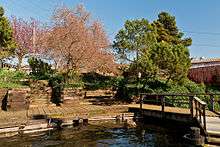Terry Pettus
Terry Pettus (August 15, 1904 – October 1984[1]) was a newspaper reporter and activist from Seattle, Washington.[2][3]
Biography
Originally from Terre Haute, Indiana,[2][3] son of a Christian Socialist, Pettus worked briefly as a reporter in Minneapolis and in Grand Forks, North Dakota, before moving to Seattle with his wife Berta in 1927. Shortly after arrival in Seattle, they lodged with artist Kenneth Callahan; Pettus went to work for the Seattle Star.[3]
In 1935, as a reporter for the Tacoma Tribune he became Washington State's first member of the American Newspaper Guild. In February 1936 he was asked by the Guild to organize its Seattle chapter. By the end of the year, this had led to the first successful strike to gain union recognition for workers at a Hearst newspaper (the Seattle Post-Intelligencer). (David Selvin of the Pacific Coast Labor Bureau also played a key role in these events.)[3]
The Tacoma Tribune closed its doors shortly thereafter. Pettus worked for a time in South Bend, Washington, editing the Willapa Harbor Pilot and becoming involved with the left-wing Washington Commonwealth Federation, initially in a drive for public power. Increasingly radicalized by the Great Depression, in 1938 Pettus joined the Communist Party USA (CPUSA). He became editor of the Commonwealth Federation's Washington New Dealer (from 1943 New World). When he tried to enlist to serve in World War II, he was rejected because this work was considered essential to the war effort.[3]
In the late 1930s, in Seattle, Pettus edited the Commonwealth Federation's newspaper and hosted the Seattle-area hootenannies (or "hoots"), which Eric Scigliano describes as "fundraising, consciousness-raising, and hellraising parties" for the federation. Pettus had originally learned the word in Terre Haute, where it meant "a party that just sort of happens" without prior planning and brought it to Seattle. When Woody Guthrie and Pete Seeger passed through Seattle, they performed at the hoots; it is believed that they picked up the term hootenanny there, and passed it into the broader American vocabulary.[2]
Pettus ran unsuccessfully for Seattle City Council in 1946, finishing last in a field of six contending for three seats.[4] Pettus was named as a member of the Communist Party by former head of the Washington Commonwealth Federation Howard Costigan in February 1948 testimony before the Canwell Committee of the Washington State Legislature.[5]
Blacklisted in the McCarthy Era at the start of the Cold War, Pettus became editor of the People's World, a newspaper associated with the CPUSA. He was charged in 1952 with conspiracy to overthrow the U.S. government, and convicted and sentenced to five years, plus an additional three on contempt charges for refusing to name names.[2] He only actually ever served 60 days,[3] and his conviction was eventually overturned by the United States Supreme Court.[2][3] Pettus left the CPUSA in 1958.[3]
Back in Seattle, Pettus moved onto a houseboat in 1958 and later played a crucial role in saving Lake Union's houseboats[2][3] and in preventing the city from dumping sewage directly into the lake.[3] Seattle mayor Charles Royer honored him in 1982 with an official Terry Pettus Day, and in 1985, the year after his death, the city dedicated the small Terry Pettus Park on the shore of Lake Union near one of the houseboat neighborhoods.[2]
Footnotes
- ↑ SSDI for 536-10-1602. Accessed online 11 February 2009.
- 1 2 3 4 5 6 7 Eric Scigliano, "What a Hoot!", Seattle Metropolitan, December 2008, p. 52-54.
- 1 2 3 4 5 6 7 8 9 10 Ross Reider, Pettus, Terry (1904-1984), HistoryLink, September 27, 2000. Accessed online 2 February 2009.
- ↑ General and Special Elections: Results for Elected Officials, City of Seattle. Accessed online 2 February 2009.
- ↑ Albert F. Canwell, et al., First Report, Un-American Activities in Washington State, 1948: Report of Joint Fact Finding Committee on Un-American Activities: Established by the Thirtieth Legislature under House Concurrent Resolution No. 10. Olympia, WA: The House, n.d. [1948]; pg. 367.
Archives
- Gordon Black, Who's Who in the History of the Washington State Communist Movement, Pacific Northwest Labor History Projects, Harry Bridges Center for Labor Studies, University of Washington. Last updated July 31, 2007. Accessed 2 February 2009.
- Terry Pettus papers. 1927-1984. approximately 2.71 cubic feet (0.077 m3) of textual materials, plus 2 folders, 1 looseleaf notebook, added ephemera and 10 cassettes. At the Labor Archives of Washington State, University of Washington Libraries Special Collections.
